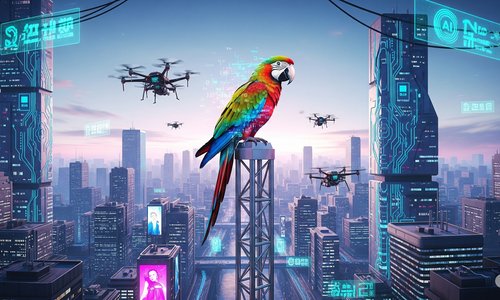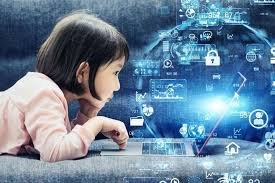
A Promessa e o Perigo da Nova Revolução Digital
A nova corrida tecnológica global levanta uma pergunta urgente: estamos prontos para confiar na inteligência que criamos?

Competências para educar na era da IA e os desafios do contexto brasileiro
Ana Paula Almeida, Andreza Garcia Lopes, Maria Clara Martins Rocha e Maria Regina Lins
É possível afirmar que a inteligência artificial (IA) tem desde suas origens pilares interdisciplinares. Estudos que deram origem ao campo da “aprendizagem de máquina”, que compõe atualmente parte da área de IA, tiveram um neuropsicólogo e um matemático, Warren McCulloch e Walter Pitts, respectivamente, como seus pioneiros. Estes, em 1943, anunciaram em uma publicação a criação do primeiro neurônio artificial (BASILIO, 2020).
Na Conferência de Dartmouth, realizada em 1956, John McCarthey e um grupo de cientistas cunharam o termo "inteligência artificial", marcando o início formal deste vasto campo de estudo. Na mesma época, os primeiros programas de xadrez demonstravam atividades de raciocínio. Na década de 1960, Alan Turing desenvolveu o "teste de Turing", que visava determinar se uma máquina era inteligente. O teste consistia na interação de uma pessoa com uma máquina através de um teclado e monitor, sem saber se estava conversando com um humano ou máquina. Se a pessoa não conseguisse distinguir, a máquina seria considerada aprovada. Assim, Alan Turing ficou conhecido como o "pai da inteligência artificial".
Nas décadas seguintes, cientistas da computação focaram no desenvolvimento de tecnologias para áreas mais específicas, como a medicina e a indústria. A IA sub-simbólica, por sua vez, também chamada de IA conexionista, foi desenvolvida para a área médica, com ênfase em redes neurais artificiais e algoritmos de aprendizado. Após o sucesso na saúde, a IA conexionista foi aplicada em diversas áreas, incluindo o deep learning, com avanços significativos a partir dos anos 2000, especialmente com o
surgimento de técnicas de processamento de linguagem natural. Dessa maneira, a inteligência artificial passa a ser usada em várias indústrias e serviços comerciais com algoritmos avançados, incluindo redes neurais convolucionais e adversárias generativas (aprendizagem profunda constituída de duas redes neurais competitivas, fornecendo a falseabilidade dos dados gerados) (FERRAREZI, 2023).
Ainda que possua um viés interdisciplinar, a IA é oficialmente um ramo da ciência da computação que pesquisa algoritmos e sistemas capazes de simular processos cognitivos humanos. Esses sistemas podem aprender com dados e tomar decisões. São capazes de realizar tarefas que normalmente exigiriam inteligência humana, como reconhecimento de padrões, tomada de decisões e processamento de linguagem natural.
Longe do ostracismo, o desenvolvimento tecnológico passou a estar cada vez mais presente na sociedade. Em nossas casas, no trabalho, nas escolas, quando temos que solicitar algum serviço, seja ele médico ou simplesmente para solicitar que o seu dispositivo toque a sua canção preferida. O que vem nos permitindo esse avanço é o desenvolvimento da IA, que através da programação dos algoritmos, consiste em tentar fazer com que os sistemas pensem e ajam como humanos.
Com o seu maior aprimoramento, as IAs se expandem com aplicabilidade e acesso também no campo educacional. Assim, uma complexidade de desafios e oportunidades surgem na discussão sobre uso responsável, ético e consciente da IA, e apontam para a regulamentação desse uso. Em um sentido prático, a IA apresenta oportunidades significativas para aprimorar o processo de ensino-aprendizagem. Tal como, desafios e riscos que compelem uma mobilização geral tanto daqueles que compõem essa área em alguma instância como das políticas públicas que a envolvem.
Com a introdução da IA no campo educacional a Unidade de Tecnologia e Inteligência Artificial em Educação da UNESCO, buscou orientar governos, sistemas educacionais e professores no uso adequado da IA com a publicação do documento intitulado “Currículos de IA para a educação básica: um mapeamento de currículos de IA aprovados pelos governos” (2022). Nesta pesquisa foram analisados internacionalmente 14 currículos aprovados pelos governos para o ensino da IA na educação básica. Diante dessa análise foram destacadas as concepções, conteúdo e implementação desses currículos a fim de orientar o desenvolvimento de um marco de ação sobre competências em IA.
Levando em consideração as recomendações da Unesco sobre currículos de Inteligência Artificial, o Brasil se apresenta como um país atrasado em relação a outros que já possuem currículos regulamentados. Isso ocorre devido a evidente desigualdade socioeconômica do cenário educacional brasileiro, especialmente durante a pandemia, que destacou a falta de acesso à tecnologia para educação remota. Este cenário também colocou em xeque o alcance da Base Nacional Comum Curricular (BNCC), que deixa em aberto essa necessidade tecnológica. Isso ressalta a necessidade de investimento e monitoramento das políticas públicas existentes para reduzir as disparidades educacionais e sociais no país.
A BNCC, o documento normativo da educação básica, lança os alicerces para a elaboração dos currículos das redes públicas e privadas. Elaborado em 2017, este documento traz uma nova proposta educacional sob a luz de dez Competências, distribuídas na aquisição de habilidades e conhecimentos a serem desenvolvidas ao longo do processo educativo, visa, contudo, a constituição de sujeitos aptos para o exercício da cidadania e do trabalho (ARAUJO, 2024). A elaboração dessas competências avança no que diz respeito a habilidades digitais, dentro do contexto da cultura digital (conforme as competências número 5 e 4), destacando-as a partir da formação crítica e ética.
É oportuno ressaltar que a resolução CNE/CP 25/2022 propõe a inclusão do componente curricular "computação e suas tecnologias" visando fazer uma integração dos processos educacionais com o letramento digital e as competências digitais dentro da educação básica. A resolução é capaz de especificar quais são as habilidades que os alunos precisam desenvolver no decorrer do processo educacional para atingir essas competências digitais integrando a cultura digital. Dessa maneira fica evidente a necessidade de formação dos educadores para que esse processo se efetive.
Tais documentos normativos na área da educação buscam promover a integração da cultura digital, mas não abordam o uso da Inteligência Artificial de forma direta. Para que os educadores estejam preparados para lidar com os avanços da IA, é essencial adquirirem competências digitais relacionadas à tecnologia, como pensamento computacional, programação e ética digital. A integração eficaz da IA no ensino permite personalizar a aprendizagem, automatizar tarefas administrativas e promover a inovação pedagógica, sem negligenciar as competências emocionais necessárias para o desenvolvimento dos alunos. A colaboração entre tecnologia e habilidades humanas é fundamental para preparar os alunos para um mundo cada vez mais tecnológico, mantendo a importância dos relacionamentos interpessoais.
Conforme análise da Unesco (2022) no que tange aos currículos de IA, estão consideradas três categorias: Fundamentos de IA que compreende as áreas temáticas de algoritmos e programação; alfabetização em dados; resolução de problemas contextuais, a categoria da ética e impacto social que englobam as áreas temáticas de ética da IA; implicações sociais da IA; e a categoria da
compreens
ão, utilização e desenvolvimento de IA
com as seguintes áreas temáticas: aplicações de IA para outros domínios; compreensão e utilização de técnicas de IA; compreensão e utilização de tecnologias de IA; e desenvolvimento de IA.
Diferentemente do contexto internacional analisado pela Unesco (2022), a integração da IA nas escolas brasileiras requer políticas públicas que incentivem um currículo apropriado às TIC (Tecnologias, Informação e Comunicação). Sobretudo, pensar em planos emergenciais para a formação e atualização dos educadores em competências relacionadas à IA para garantir uma educação de qualidade e alinhada com as demandas do século XXI. A formação continuada dos profissionais da educação, aliada a políticas educacionais inclusivas e investimentos em tecnologia, são fundamentais para preparar as escolas brasileiras para a era da IA e promover uma educação inovadora, equitativa e centrada no aluno.
Educar na era da IA significa estar preparados para utilizar e compreender essas tecnologias e assim, preparar os alunos para utilizá-las de forma crítica e ética, desenvolvendo habilidades de resolução de problemas complexos, colaboração e pensamento crítico. A IA também pode ser explorada no campo da criatividade, usada como instrumento de capacitação para essa habilidade humana, como recurso de expressão, comunicação e ideias inovativas.
O debate entre IA e educação é necessário e constante. É por este meio que a IA apresenta novas perspectivas sobre o papel da escola, especialmente no contexto sociocultural com a colaboração entre humanos e IA. Isso impacta os currículos, a formação de professores e alunos, e a infraestrutura tecnológica das escolas. Esse debate se estende sobre como a IA pode ser utilizada para estimular o aprendizado e apoiar os professores na sala de aula, minimizando os impactos negativos.
O atual momento é de confluência entre IA e educação, segundo Pereira e Moura (2023), e, é o que leva a indagar sobre a necessidade de formação para o uso crítico e responsável das ferramentas de IA. Formação que vise o letramento em IA como uma competência para o exercício da cidadania, devendo ter, portanto, um maior alcance na sociedade brasileira. Considerando a educação escolar como base fundamental para a formação do sujeito, torna-se importante mencionar que o contexto educacional brasileiro deve estar preparado para as transformações digitais que estamos vivendo.
Embora a urgência da preparação para o uso da IA na educação esteja latente, ainda não há muitas evidências de quais os passos a serem tomados para que esse processo se estabeleça com a velocidade necessária e equiparada aos avanços da IA na sociedade. Para além das regulamentações já em processo e da garantia da BNCC no que tange às competências digitais, novas estratégias precisam ser exploradas para fomentar e assegurar que esse processo não aumente a desigualdade social do país no contexto educacional.
Contudo, os cenários da educação no que tange a inserção da IA ainda não estão solidificados, carecem de uma base que promova desde a formação e atualização dos professores para lidar com essa tecnologia em sala de aula, além da infraestrutura tecnológica nas escolas. Exemplificando, o sistema educacional brasileiro se divide entre privado e público, que se caracteriza por um distanciamento entre alunos que estudam em escolas estruturadas e equipadas tecnologicamente e outros que possuem dificuldade até mesmo de deslocamento para chegar ao centro escolar. O desenvolvimento ágil da IA exige que os educadores, mesmo diante dessa discrepância do cenário social brasileiro, se adaptem às novas tecnologias e metodologias, preparando-se para integrar a IA de forma eficaz em suas práticas pedagógicas. Dessa forma, a IA se torna uma aliada do processo pedagógico, voltando-se para a tendência de uma educação mais eficiente, personalizada e acessível, em outras palavras, apoiando uma mudança educacional.
Referências
ARAUJO, Camila Sabino. Inserção da inteligência artificial na educação. Revista Ilustração, Cruz Alta, v. 5 , n. 2, p. 53-60, 2024. Disponível em: https://journal.editorailustracao.com.br/index.php/ilustracao/article/view/301/240. Acesso em: 4 jul. 2024. BASILIO, Rodrigo. Decodificação de estados cognitivos utilizando neuroimagem e métodos de aprendizado de máquina. 2020. 114f. Tese. (Doutorado em Ciências Médicas) - Programa de Pós Graduação em Ciências Médicas. Instituto Dor Pesquisa e Ensino, Rio de Janeiro, 2020. FERRAREZI, Thiago. Tipos de IA: Características e aplicações. Inteligência Artificial (IA). Aula Online: EBAC, 2024. PEREIRA, Ives da Silva Duque, & MOURA, Sergio Arruda de. Theoretical explorations and opportunities for curricular integration of artificial intelligence (ai) literacy in basic education. SciELO Preprints. 2023. Disponível em: https://doi.org/10.1590/SciELOPreprints.7294. Acesso em: 3 jul. 2024. UNESCO. Currículos de IA para a educação básica: um mapeamento de currículos de IA aprovados pelos governos. Paris: UNESCO, 2022. Disponível em: https://unesdoc.unesco.org/ark:/48223/pf0000380602_por. Acesso em: 5 jul. 2024.

A nova corrida tecnológica global levanta uma pergunta urgente: estamos prontos para confiar na inteligência que criamos?

Por que dominar a IA será a nova alfabetização do século XXI

Conselhos de Administração devem evoluir da supervisão reativa para a antecipação estratégica, frente à crescente complexidade e volatilidade dos ambientes de negócios.

De 14 a 25 de julho, reserve suas manhãs das 08h00 às 09h30 para participar da tradicional Maratona I2AI! Uma jornada intensa com debates e palestras sobre temas essenciais: Ética,